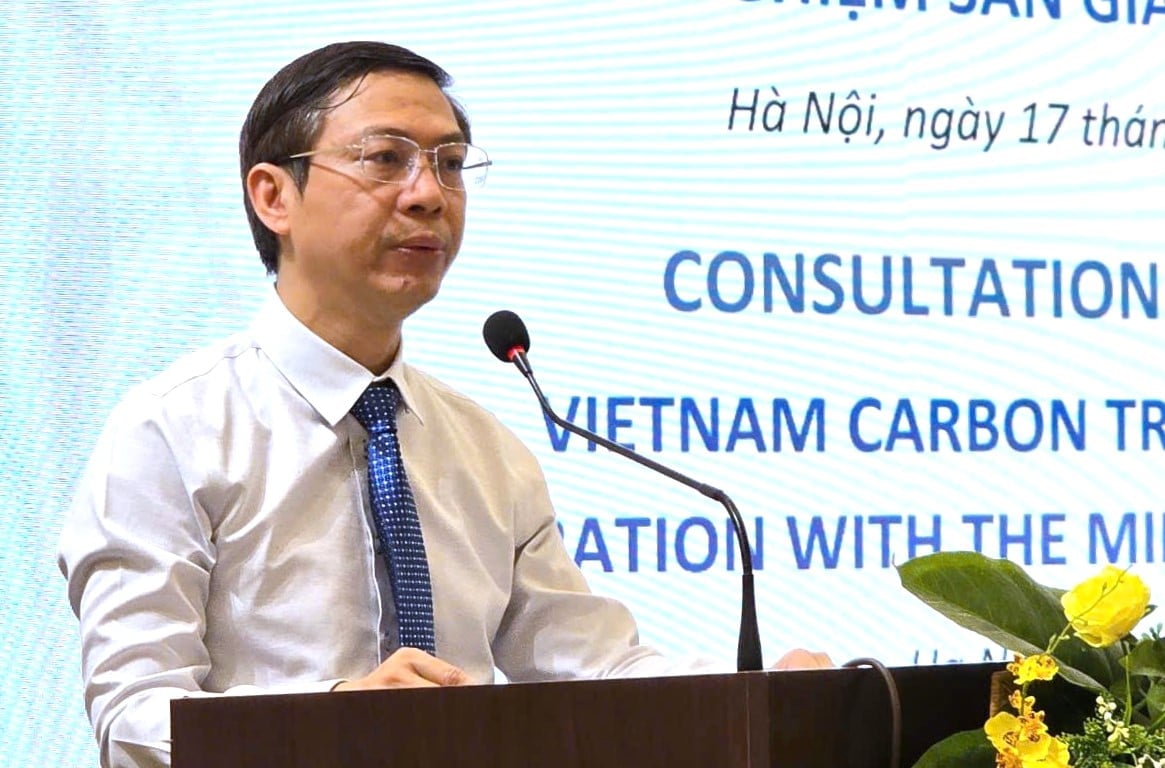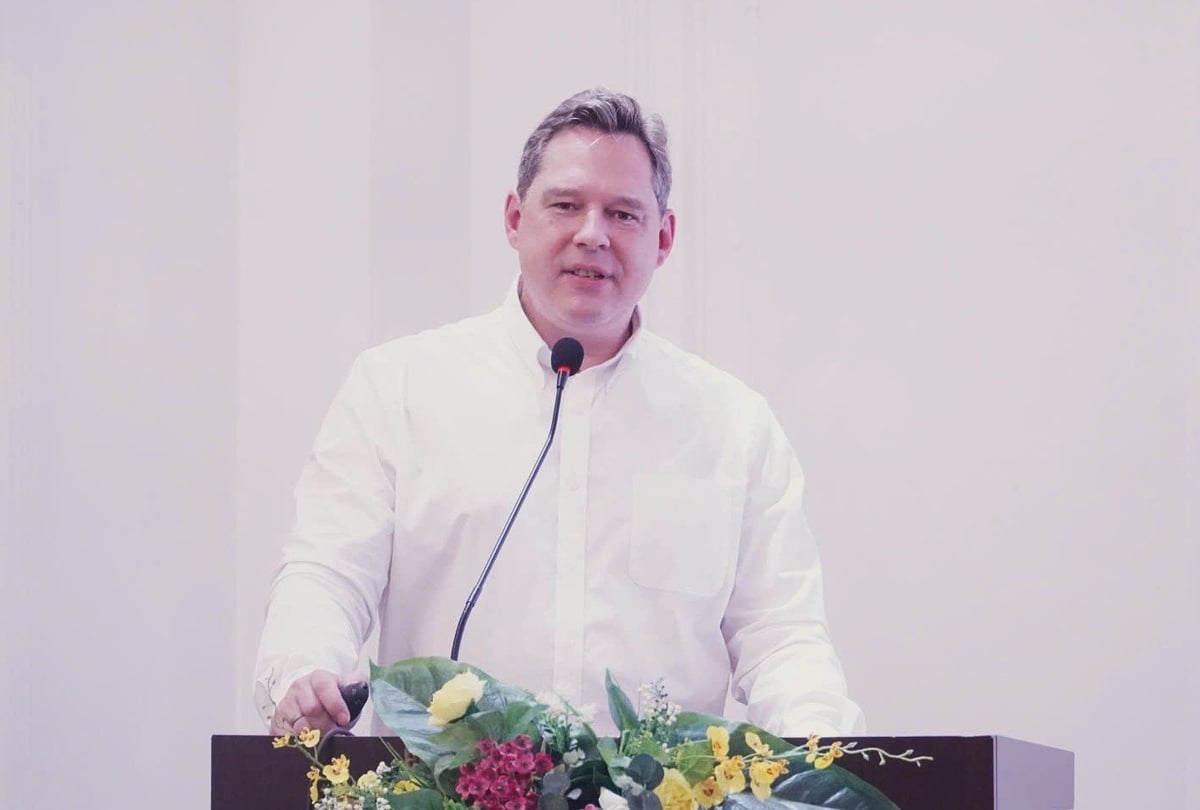December 17, 2025 | 01:02 GMT +7
December 17, 2025 | 01:02 GMT +7
Hotline: 0913.378.918
December 17, 2025 | 01:02 GMT +7
Hotline: 0913.378.918

Mr. Truong Huynh Thang, Deputy Director of the Legal Department (Ministry of Finance), said that the Ministry of Finance is finalizing the dossier to submit to the Government for the issuance of a decree on the carbon trading platform. Photo: Trung Nguyen.
The proposal to establish and develop a carbon market in Vietnam has clearly defined the implementation roadmap, including a pilot phase from 2025 to the end of 2028 and the official operational phase starting in 2029. As the lead agency for the proposal, the Ministry of Finance is coordinating with the Ministry of Agriculture and Environment, along with other relevant ministries and agencies, to prepare the legal framework and infrastructure for establishing a domestic carbon exchange.
According to Mr. Truong Huynh Thang, Deputy Director of the Legal Department (Ministry of Finance), the development and operation of a carbon credit exchange focusing on high-emission industries is a common approach adopted by many countries, which has proven to be effective in practice. The Ministry of Finance is actively and urgently finalizing the dossier to submit to the Government for the issuance of a Decree on the carbon exchange, serving as the foundation for the pilot phase until 2028.
Mr. Thang stated that once operational, the carbon exchange will be a centralized market where high-emission industries can trade carbon credits. This tool not only helps realize the goal of reducing greenhouse gas emissions but also incentivizes enterprises to innovate technology, invest in environmentally friendly production solutions, allocate resources efficiently, attract green investments, and generate revenue for climate projects.
The Energy Transition Partnership (ETP), funded and managed by the United Nations Office for Project Services (UNOPS), has implemented a technical assistance project for the Ministry of Finance to provide scientific and technical foundations and recommendations for the draft Decree on the domestic carbon credit exchange and related legal documents. To date, the initial assessment has been completed, including identifying governance and legal gaps.

Vietnam’s carbon market will be piloted from 2025 through the end of 2028, with official operations starting in 2029. Illustrative photo: Trung Nguyen.
The operational model for Vietnam’s domestic carbon credit exchange is being built upon the existing stock market infrastructure, leveraging the systems of the Hanoi Stock Exchange (HNX) and the Vietnam Securities Depository and Clearing Corporation (VSDC). The Ministry of Finance is collaborating with the Ministry of Agriculture and Environment and the State Securities Commission in management and oversight efforts.
Regarding carbon credit pricing, the lack of mechanisms to limit price volatility makes the market vulnerable to uncontrolled fluctuations and excessive speculation. Currently, there are no regulations on real-time transaction monitoring, detection of abnormal trading behavior, or penalties corresponding to levels of violations to address abuse or price manipulation. Experience from international carbon markets shows they have faced challenges from VAT fraud and phishing attacks leading to fake trades, money laundering, hidden orders, and price manipulation with serious consequences. Notably, there is no mechanism to ensure transparency in the price formation process of carbon credits (such as continuous trading, limit order books, and public price disclosures).
According to Professor Michael Mehling, Deputy Director of the Center for Energy and Environmental Policy Research at the Massachusetts Institute of Technology (MIT), establishing a robust policy monitoring mechanism can reduce risk, narrow the bid-ask spread, and lower businesses' compliance costs.
Vietnam needs to build a policy toolkit that includes information verification processes and safeguards for the carbon credit transaction registry to prevent fraud. Additionally, it is essential to limit the quantity of assets that can be held and purchased in the market to curb speculation and establish a central counterparty mechanism so that all transactions go through the exchange. To detect abnormal transactions, Vietnam must invest in real-time trade analysis and reporting systems and define penalty regimes by severity to ensure deterrence.

Professor Michael Mehling, Deputy Director of the Center for Energy and Environmental Policy Research at the Massachusetts Institute of Technology (MIT), believes that Vietnam needs to develop a comprehensive policy toolkit for carbon credit trading. Photo: Trung Nguyen.
Furthermore, public monitoring through market data disclosure will help build trust among businesses and communities, facilitating future carbon market implementation. “Regularly publishing public data tables on trading volumes, prices, and outstanding contracts enables the community to supervise and prevent fraudulent and abusive behavior,” Professor Michael Mehling emphasized.
Sharing from China’s experience in developing its carbon market, Professor Zhang Xiliang, Director of the Institute of Energy, Environment and Economy at Tsinghua University and Chair of the China Emissions Exchange (CETA), also stressed that the legal framework is a key factor in building a high-quality, sustainable carbon market and carbon credit exchange.
China has enacted a specific decree on establishing and operating the exchange issued by the State Council, providing a solid legal foundation for all market activities. Government agencies can serve as intermediaries between potential sellers and buyers of emission allowances to set starting prices. Additionally, it is necessary to define the ideal business model for the exchange and its affiliation with state-owned enterprises or nonprofit organizations.
According to Mrs. Adritha Subbiah, Regional Manager of the Southeast Asia Energy Transition Partnership (ETP), a well-designed exchange can help achieve national greenhouse gas reduction targets. Many models and international experiences exist in this field, which provides Vietnam with a favorable basis for choosing the most suitable model for its national context.
Translated by Huong Giang

(VAN) Trading forest carbon credits is to reduce greenhouse gas emissions while creating sustainable livelihoods for local communities.

(VAN) Expanding the area of forests with FSC certification creates a foundation for elevating the economic value of forests, promoting sustainable management, and offering opportunities to participate in the carbon credit market.

(VAN) MAE and GIZ organized the conference to strengthening capacity and readiness for EUDR implementation in Vietnam.

(VAN) When women, men, children, and people with disabilities all have the opportunity to maximize their potential, the economy will grow, and the country will prosper.

(VAN) Effective disaster prevention and the creation of sustainable livelihoods through practical forestry policies are the distinct and crucial values of special-use and protection forests.

(VAN) The policy movement regarding carbon emission reduction is opening up a new approach, linking national goals with practical agricultural production.

(VAN) Deputy Prime Minister Tran Hong Ha made this request at the 24th meeting of the National Steering Committee for Combating IUU Fishing with 21 coastal provinces and cities joining virtually.